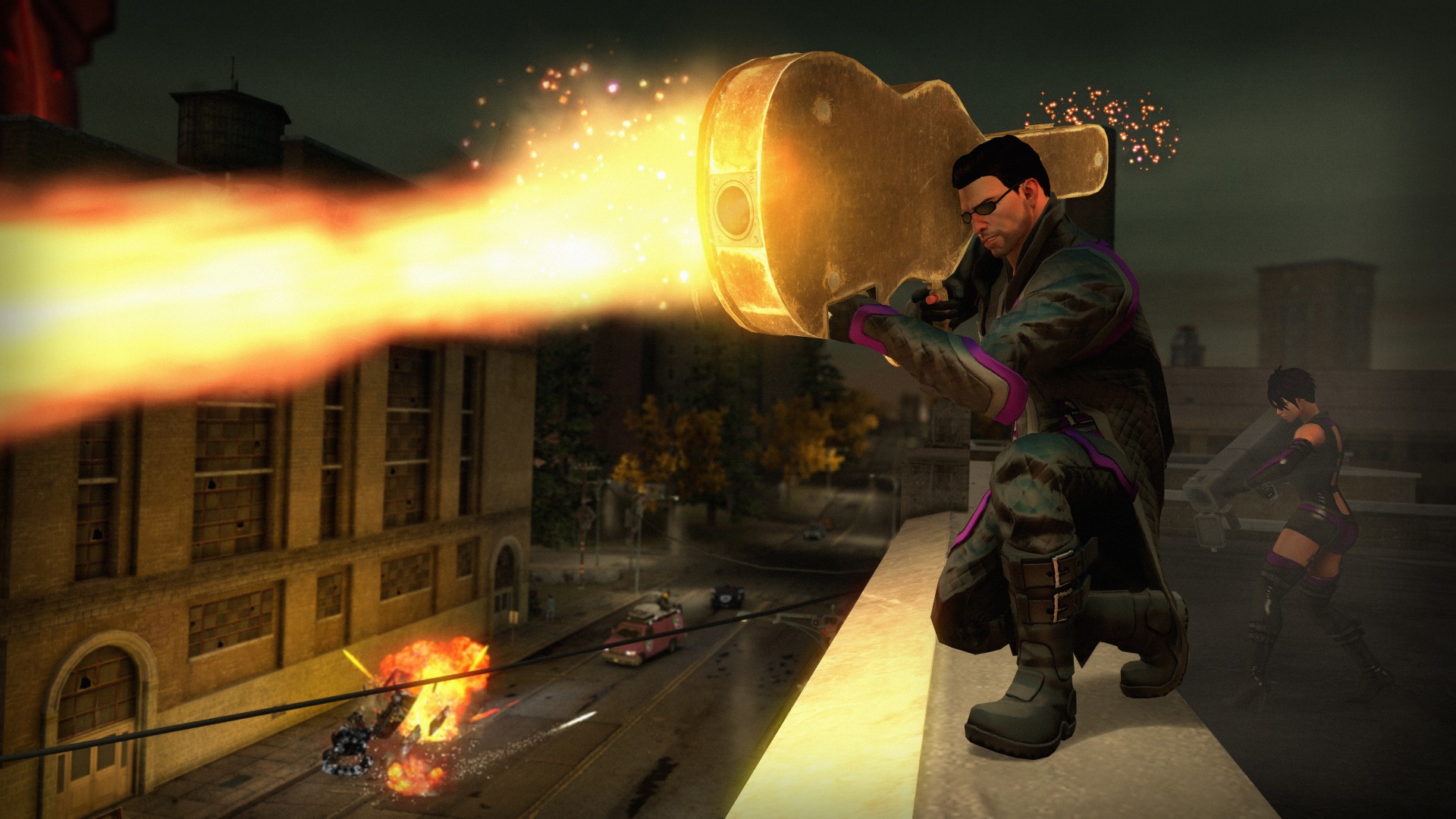Our Verdict
It might not have the sheen of Grand Theft Auto, but Saints Row IV is both gloriously stupid and stupidly good.
PC Gamer's got your back
Expect to pay: £40 / $50
Release: Out now
Developer: Volition
Publisher: Deep Silver
Multiplayer: 2 player co-op campaign
Link: Official site
This is the only game I've ever had to pause because I was laughing too much to play. I want to tell you about the exact section that caused me to crease up. I want to sit you down, do the voices, and perform a poor recreation of the whole thing. And I want you to know about the other hundred-odd moments that physically contorted my real-life face into real-life grins or my real-life mouth into real-life laughs.
I won't tell you about all of them because I'll spoil them. But I want you to know because they're so joyful, so playful, that they turn this third sequel to an average Grand Theft Auto clone into one of the most fun videogames I've ever played.
Like Saints Row the Third, Saints Row IV is set in the city of Steelport. Except it isn't. The game starts with an alien attack on Earth, with you as president of America. Except technically it doesn't do that, either – the game actually starts once you've infiltrated a terrorist base to find a nuclear missile, and clambered up the side of it mid-flight, yanking vital bits of wiring out, as Aerosmith's 'I Don't Wanna Miss A Thing' blares. The missile explodes, you fall to earth, and manage to crash through the ceiling of the oval office. Congratulations, you're president!
I'm including this precise description because it sets SRIV's tone early, and better than I could with words like 'madcap' or 'anarchic' or 'what?!' This tone continues throughout – throughout the subsequent alien invasion, throughout your incarceration in a Matrix-esque simulation of Steelport (see why it technically isn't the same place?) – and all the way through the ten-hour campaign and twenty-plus hours of side missions.
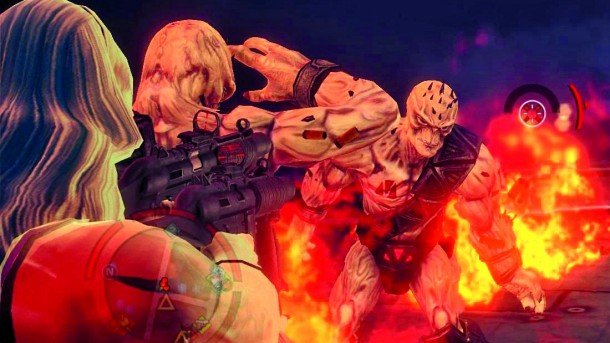
It's even present in the character creation screen. Long ago, PC Gamer developed the concept of 'maximum face': mutants produced by pushing every slider to full. The overweight, hollow-cheeked, elfeared weirdo you see in these screenshots is a product of that. For the first three hours, simply seeing his face kicked me into fits of giggles.
I played my hero for laughs, dressing him in a towel, then in Lara Croft hotpants, then as a giant foam hotdog. But you're also free to play him straight, a man in a suit amid the madness of an imperfect simulation of an already-mad city. Or you're free to play as a her. Or as a him with a her voice, or a her with a him voice, or a her with a her voice pitch-shifted to 100%, or even as a him with Nolan North's voice. Or, if you really fancy, you can play as a small white hovering toilet.
If you really fancy, you can play as a small white hovering toilet.
I created a monster, with an ageing wrestler's body, a pencil moustache, and giant buggly eyes, and gave him a cockney voice pitch-shifted to 60%. He talked like Jason Statham huffing a birthday-partyful of helium balloons and loomed out of the screen like a child's drawing of a nightmare. By the end of the game, I loved him. I'm still not quite sure how that happened.
But I think I've got an idea. SRIV is surprisingly inclusive. It trades on ridiculousness – but unlike its raison d'etre Grand Theft Auto, it's never sneering or cruel. Where GTA lauds movies and music as cultural touchstones, SRIV takes on games. Mass Effect is one of its most visible targets. Punching out of the alienrun Steelport simulation for the first time, I got my own spaceship, with cabins for a crew I'd later recruit by rescuing them from the Matrix.
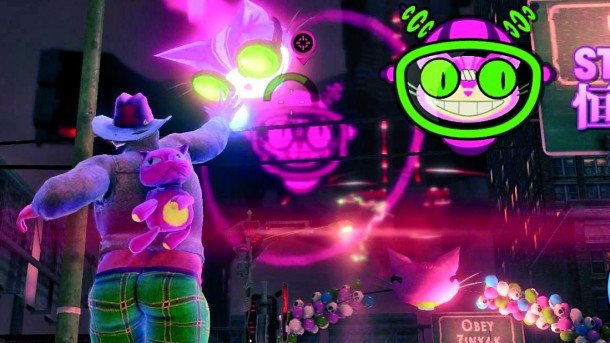
Press E on a crewmate and you can talk to them. Press R and you'll 'romance' them. There's no convoluted conversational minefield to unlock fade-to-black shagging here, though: almost all of your friends – male, female,å or robot – will immediately agree to a quick fumble. It's a pastiche of BioWare's RPG sex vending machines – feed enough in and collect your hump from the slot below – but also indicative of SRIV's desire to simplify.
That desire is the best thing about the game. Options unfurl as you play. Steelport is a city full of cars, and, as in GTA, any of them can be hijacked and driven. They felt good. Half an hour into the game, I unlocked nitrous boosts – for all vehicles. My already-quick cars went faster. They felt great. An hour into the game, I unlocked super jumps. Holding the spacebar would power-up a leap to get me halfway up a tower-block. It felt fantastic.
Ten hours in and I barely needed to touch the ground.
Two hours in, I could run faster than cars. It felt brilliant. Three hours in, I'd unlocked a glide move that meant I could float between objectives like a disgusting flying squirrel. It felt amazing.
Ten hours in and I barely needed to touch the ground. My favourite way to get to a story mission-marker was to sprint to Steelport's central island, bound up the tallest skyscraper while charging an upgraded tier three superjump, then leap off and glide toward my objective. Fifty storeys above it, I'd turn myself into a human missile through an upgradeable ability and slam to the ground with a powerful shockwave. Pedestrians and cars would careen away from my impact point, and I'd saunter the few feet to my destination in luminous pink high heels. It felt fucking glorious.
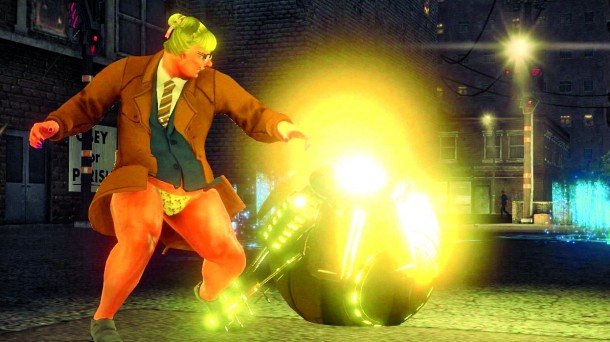
There's a full customisation system for all the cars, in addition to pilotable alien hoverbikes, UFOs and attack helicopters. Any minor inconvenience I had, I found stripped away by an upgrade. Glowing blue collectibles hidden on buildings and bridges around the city let me upgrade my movement capabilities, as well as a suite of four powers that include ice blasts and telekinesis. I found myself entering mini-trances and collecting these blue orbs for ten, fifteen minutes at a time, revelling in the joy of superpowered movement and the camp little yelp my character produced whenever he collected one.
The simulated setting lets SRIV play wherever it wants to.
Simulated Steelport's shops can be hacked to provide new clothes and weapon options, as well as turning the local populace to the Saints' side. Towers can be climbed and turned from angry alien red to calm blue. These missions are structured further by your crew, who'll ask you to perform certain tasks to 'destabilise' the simulation.
Some of these missions are weak: clearing waves of foes gets tiresome when they take too long to turn up, and the Audiosurf minigame goes on too long. Others are inspired, particularly the destruction jobs where you're given the keys to a tank, and the insurance fraud schemes, where you purposefully ragdoll yourself into traffic to earn points.
But it's the story missions that are the strongest, using characters from the three previous games to make them bombastic, funny and imaginative. The simulated setting lets SRIV play wherever it wants to, the standout for me being a base infiltration in the Metal Gear Solid vein that forced me to shoot out every light source in the facility – and the line “that light had a family.” The setting also enables the game to cast its staggering level of violence in an acceptable light. Enemies, aliens, pedestrians: all of them simulations to be suplexed onto the concrete by one of your ludicrous melee moves and left to fade back into imaginary numbers.
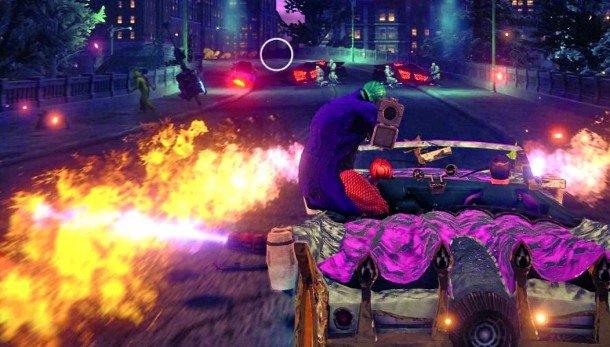
It's not the most technically proficient game. Five or six times cutscenes failed to trigger because I was mid-animation when they were due to start, clipping was a constant problem, and enemies occasionally got stuck in the scenery. Fortunately, it's not broken: Steelport with all its moving parts was designed to push consoles at the end of their lifespan, but my i5 CPU and two-year-old graphics card ran it on high without trouble. Graphics options that included v-sync and anti-aliasing – but no field of view – were more than enough to keep me happy in a city that never chugged as I glided through its skies.
Saints Row IV is a game that's comfortable with itself. It's solved how to tie callous violence to a character you actually want to inhabit by means of a narrative device, it's solved fiddly movement by an intoxicating set of movement mechanics, and it's solved the leery, exploitative tone of previous sequels through genuine affection for its cast and equality of player characters – man, woman or toilet, all can wield a giant purple dildo bat. It's a vast, mechanically joyful game, the result of chucking all the fun and freedom of gaming into the same city.
Saints Row was born of Grand Theft Auto, but although both feature open cities and freeform violence, they've diverged. Grand Theft Auto is desperate to be a film, to be satire, to be an experience. Saints Row IV wants to be a game, and by showing its heartfelt love for the medium, it's become something wonderful.
It might not have the sheen of Grand Theft Auto, but Saints Row IV is both gloriously stupid and stupidly good.
